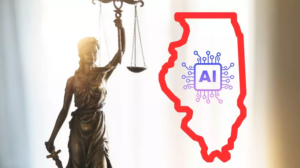 By Tiffany E. Alberty, Alex W. Karasik, Gerald L. Maatman, Jr., and Brandon Spurlock
By Tiffany E. Alberty, Alex W. Karasik, Gerald L. Maatman, Jr., and Brandon Spurlock
Duane Morris Takeaways: On August 9, 2024, Illinois Governor J.B. Pritzker signed House Bill 3773, which amends the Illinois Human Rights Act to address an employer’s use of artificial intelligence in employment-related decisions such as recruitment, hiring, promotion, retention, and discipline if it subjects an employee to discrimination. The new law gives the Illinois Department of Human Rights (IDHR) the power to adopt any rules necessary for the implementation and enforcement of the statute, including determining rules on whether notice will be required and the timing and methods of such notice. The amendment will take effect January 1, 2026.
For employers with operations in Illinois who embrace the use of this cutting-edge technology, this new law is the latest compliance piece on a constantly evolving employment law checklist.
Background Of Amendment
The Illinois House introduced H.B. 3773 in February 2023 by legislative members looking to implement safeguards where artificial intelligence systems are used in employment-related decisions. The bill received nearly unanimous support, passing the House 106-0, and the Senate 57-0. The bill reached the governor’s desk in June 2024 and was signed before summer’s end. The bill comes on the heels of Colorado’s sweeping AI legislation enacted in May 2024 covering not only employment related decisions, but also education, financial lending, government services, healthcare services, housing and insurance. Illinois is now one of the 34 states that has either enacted or proposed legislation related to artificial intelligence. Illinois lawmakers assert that the new law is a proactive step toward preventing the unintended consequences of using AI-technology in hiring.
Legislative Revisions
In essence, the new law prohibits an employer from using artificial intelligence if it has a discriminatory effect on employees based on a protected class or uses zip codes as a proxy for a protected class, and requires employers to give notice if the employer is using artificial intelligence for the following employment related purposes:
-
- Recruitment
- Hiring
- Promotion
- Renewal of employment
- Selection for training or apprenticeship
- Discharge
- Discipline
- Tenure (or the terms, privileges, or conditions of employment)
See 775 ILCS 5/2-102(L)(1).
In enacting the new law, Illinois legislatures braved the murky waters of attempting to define artificial intelligence, which has proven difficult for other state legislatures that tackled this challenge, resulting in a patchwork of definitions. (See, e.g., Connecticut S.B. 1103, Louisiana S.C.R. 49, Rhode Island H 6423, Texas H.B. 2060.)
Here, the amendment defines Artificial Intelligence as:
a machine-based system that, for explicit or implicit objectives, infers, from the input it receives, how to generate outputs such as predictions, content, recommendations, or decisions that can influence physical or virtual environments. . . [and] includes generative artificial intelligence.
See 775 ILCS 5/2-101(M).
It remains to be seen whether the Illinois definition will prove adequate or cause uncertainty and confusion. Importantly, the new law empowers the IDHR to “adopt any rules necessary for the implementation and enforcement of this subdivision, including, but not limited to, rules on the circumstances and conditions that require notice, the time period for providing notice, and the means for providing notice.” When the law goes into effect at the start of 2026, it will be important to monitor what rules and guidance the IDHR offers regarding implementation and enforcement.
Impact Of H.B. 3733 And Other Current And Proposed AI-Laws
As more employers incorporate artificial intelligence into their employment-related activities, it will be important to balance the benefits of using AI with the risk of running afoul of the ever evolving legal landscape, because not only is H.B. 3773 sweeping in scope, in that it impacts recruitment, hiring, promotion, retention, discipline, termination, benefits, etc., but it is also nebulous because it is not clear what it means to “ha[ve] the effect of subjecting employees to discrimination.”
Like other states across the country, Illinois lawmakers are leaning into implementing proactive measures to regulate artificial intelligence related to employment decisions despite the fact that the technology is still so new and adoption is in its early stages. The challenge for Illinois employers will be staying abreast of how these new laws and how they are interpreted and enforced.
H.B. 3773 is not the first artificial intelligence law applicable to Illinois employers. In January 2020, the Illinois Artificial Intelligence Video Interview Act went into effect, which applies to all employers that use an AI tool to analyze video interviews of applicants for positions based in Illinois. The law requires employers to notify applicants before the interview that AI may be used to analyze their video interview and obtain the applicant’s consent.
In addition to these two relatively recent AI-based laws, in February 2024, the Illinois House sent H.B. 5116 to the State Senate, which is a proposed law that would require any “deployer” of an automated decision tool to perform an impact assessment and provide that assessment to the IDHR. The deployer also will have to notify a person who is subject to a “consequential decision” that an automated decision tool is being used to make, which could be in the context of employment, education, housing, healthcare, financial services, among other decision making categories.
Implication For Employers
As AI adoption continues to expand within workplace operations, although H.B. 3773 does not take effect until January 2026, Illinois businesses would be wise to begin assessing whether their AI-systems are at risk of running afoul of the statute. Illinois employers currently using AI technology that may fall under the statute will want to work with counsel and experienced vendors to assess their systems for evidence of bias and/or discrimination. As mentioned, it also will be important for Illinois employers to monitor any directives issued by the IDHR regarding the new law, in particular with respect to any rules around notice and/or consent.
